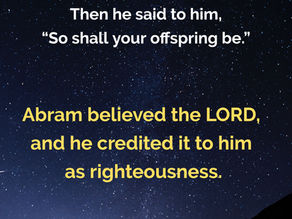Psalm 90:1-4 - Indescribable
- Chad Werkhoven
- Jan 3, 2024
- 3 min read
God's infinite nature isn't meant to confuse you, but to bring you comfort.

Psalm 90:1–4 (ESV) A Prayer of Moses, the man of God. 1 Lord, you have been our dwelling place in all generations. 2 Before the mountains were brought forth, or ever you had formed the earth and the world, from everlasting to everlasting you are God.
3 You return man to dust and say, “Return, O children of man!” 4 For a thousand years in your sight are but as yesterday when it is past, or as a watch in the night. |
Listen to passage & devotional:
Belgic Confession of Faith, Article 1
We all believe in our hearts
and confess with our mouths
that there is a single
and simple spiritual being,
whom we call God—
eternal,
incomprehensible,
invisible,
unchangeable,
infinite,
almighty;
completely wise,
just,
and good,
and the overflowing source of all good.
Summary
Thinking about the transcendence of God - that is, His overarching control, authority and presence over all things - can seem quite intimidating, but that's not the way Moses approaches the subject. Moses sees the overwhelming attributes of God as being the source of our comfort: that God is "our dwelling place (literally our refuge/assistance) from generation to generation."
Moses is uniquely qualified to write a Psalm like this, describing God's eternal infiniteness. Moses isn't writing abstract, theoretical theology here; he's writing from experience! Moses spent time in the direct presence of God; so much so that when he came down from the mountain, his face glowed! This is one of the reasons the introduction to Psalm 90 calls Moses "the man of God."
Our words quickly become inadequate when describing God's eternal nature. We can say along with Moses here that God existed before the mountains were born, and that He was the one who brought for the whole world (meaning all created things), but to say that God existed before time is incongruent, since terms like before and after are terms that require time to exist in order to make sense. Time itself is part of God's creation, and because God exists outside of the time He created, then temporal descriptions don't apply to Him.
This is why Moses writes that "from everlasting to everlasting, you are God." Moses goes on to explain that "A thousand years in your sight are like a day that has just gone by," to which Peter will add that "With the Lord... a day is like a thousand years (2 Peter 3:8)."
Dig Deeper
As we spend the next few days being reminded of not just who God is, but what He is, you might notice that most of the terms we use to describe Him are negative. This certainly doesn't mean we have a dim view of God, but rather that ultimately all we can do in detailing some aspects of His character is to say what He is not.
Such is the case with the two attributes we're concentrating on today. It's easy to see how the word infinite is a negative term; it simply means not-finite. There is no end to God's divinity. It can not be contained, or even fully described.
But even the word eternal is a negative term, in that we can only describe what it isn't, not what it is. To be eternal is to have no beginning and no ending.
Trying to think about concepts that exceed out linguistic capacities may be giving you a headache by now. But remember, the Bible doesn't describe God's eternal and infinite nature to confuse or intimidate you, but rather so that you can find peace in Him, your indescribable Dwelling Place.
ACKNOWLEDGE WHO GOD IS: Our Father, the one who brought forth the whole word and everything in it;
ALIGN YOUR LIFE WITH GOD'S WILL: Thank God for being your dwelling place, and pray that you will do the hard & sometimes confusing work of knowing Him as the Bible describes Him;
ASK GOD FOR WHAT YOU NEED:
Read the New Testament in a year! Today: Mark 3



















Comments